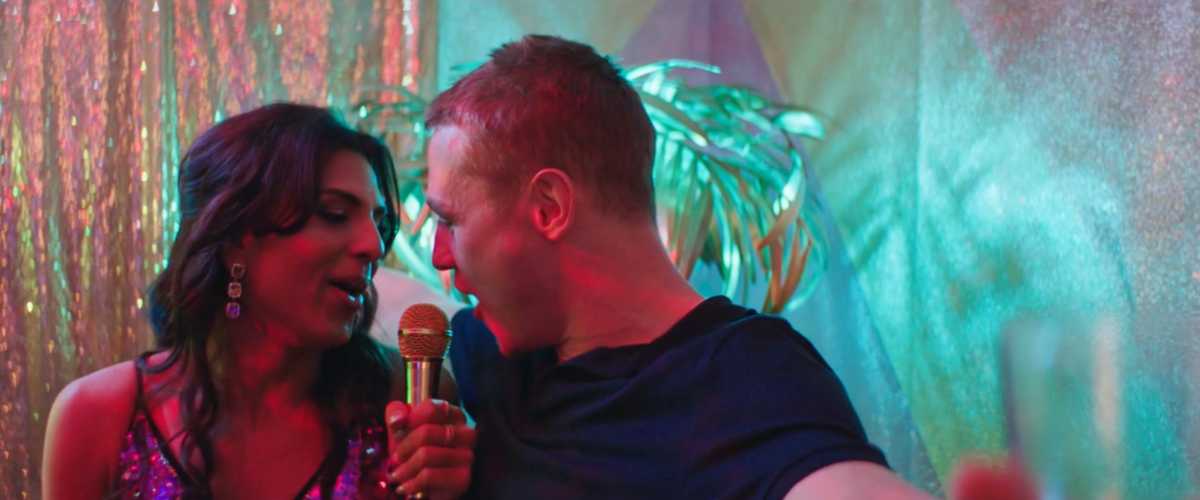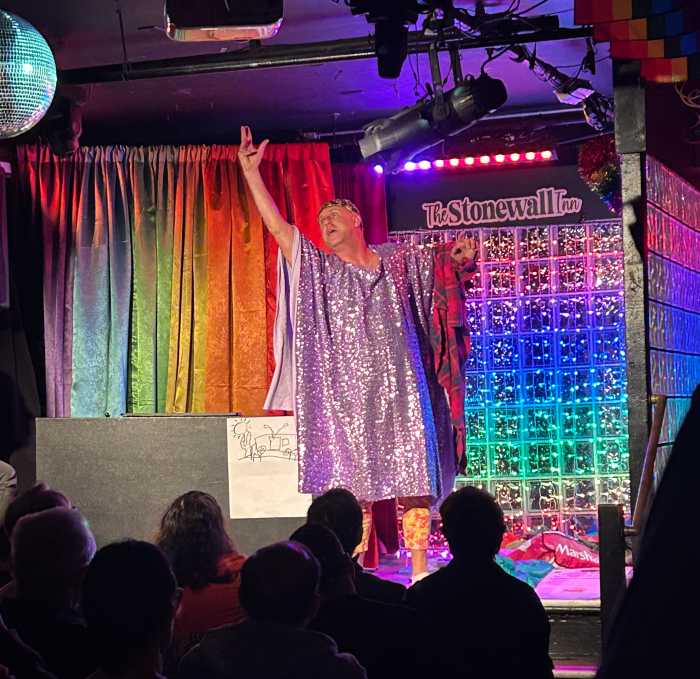The irresistibly charming and poignant romance, “Unicorns,” directed by Sally El Hosaini and screenwriter James Krishna Floyd, has Luke (Ben Hardy), a mechanic, unexpectedly falling for Aysha (Jason Patel), whom he meets at a drag show in an underground club one night. Luke is attracted to Aysha, but after they kiss, Luke notices her Adam’s apple, and he recoils. However, Aysha acts on their spark, and she tracks Luke down to offer him a job driving her to events. As Luke and Aysha spend more time together alone in the car, he becomes more interested in and protective of her. They both eventually act on their desires.
Both Patel and Hardy deliver terrific performances. In his feature debut, Patel makes Aysha endearing, and he creates an air of poignancy when Aysha visits her family as Ashiq. In contrast, Hardy initially plays up Luke’s inchoate nature, but as he catches feelings for Aysha, his emotions become quite palpable and moving.
The actors spoke with Gay City News about their characters, their on-screen romance, and making “Unicorns.”
Jason, you give a fantastic performance here. And you are always performing — when Aysha is getting dressed, when she is dancing, when she is trying to impress Luke and his son, Jamie (Taylor Sullivan), and when she is Ashiq. What can you say about the work you did for the role? It is very physical — you even get a catfight!
Jason Patel: I did a lot of prep and research, which was really helpful. I went out and explored and met the queens. I knew the scene as I had been to some of the club nights, which are such a hoot. Aysha and Ashiq are always “on” and Luke is the catalyst who says, “You don’t need to do any of those things when you are around me.” But Aysha feels she needs to. Aysha/Ashiq has been in survival mode the whole time. That’s how they stay alive.
We see how fierce and tough and determined and resilient Aysha is, but we get very few private moments of Aysha or Ashiq alone.
We are all complex people. I looked at it as two characters who are separate people and tried to bring them together. You can’t be “on” all that time; that is really exhausting. Finding the balance in those moments was [tricky] because both characters are always on the go.
Ben, I found your performance to be really moving in the second half as Luke catches feelings for Aysha. This is not an “exotic holiday” for him. Can you talk about finding Luke’s character and his emotions? He redefines himself over the course of the film and that is beautiful to watch.
Ben Hardy: Luke’s thought process is that if he hadn’t accidentally stumbled into that gaysian scene in the restaurant, he never in a million years would have sought it out. He had to be pushed into it a little bit, but having met Aysha, he is so compelled by her and wants her so much. He is a very instinctive sort of guy; he doesn’t think long term effects of these things, but the immediate thing. He does think if people found this out, his whole world would completely explode, and everything he has would be threatened. For him it’s that conflict. He doesn’t want to fall in love with Aysha; it’s very inconvenient. That sounds callous and cold, but it’s true. That’s a problem with society’s barriers. What is beautiful is the power of love between the two of them. It transcends those barriers. Luke realizes that he needs Aysha and Ashiq too. We see that in a hospital scene. That may be when we warm to him more because he is embracing Aysha and Ashiq—the whole package. He wants to be with this whole person regardless.
There are some impassioned moments between Aysha and Luke—and not just the sex scene, which is both tough and tender. To me, the most intimate scene is of them singing karaoke. Luke just gets this look in his eyes and knows that he really loves Aysha. Can you talk about how did you created the dynamic between these two lovers?
Ben Hardy: I like to think Jason and I have a very natural chemistry. We kept that chemistry by not having any contact with each other until we filmed. We filmed the love scene first, so there was that element of nervousness that two people would have in that moment. That really added something.
Jason Patel: We had a really natural rapport. Partially the success of the film is that it was not filmed in chronological order. We got to know each other throughout the film, and the karaoke scene was near the end. It was a pickup scene — we need this moment to tie things together. There are tender moments that the audience sees, but for the characters are more subconscious.
Ben Hardy: We shot that pickup scene because the filmmakers wanted to make clear that Luke staring at Aysha in the car was not reading as lust — that there was something deeper and more tender and loving between them.
Both characters live a kind of double life. I think they each feel a sense of shame, and experience loneliness. What do you think Aysha and Luke saw in each other?
Jason Patel: When you are in a group of people and surrounded by so many people, you can still feel alone. That’s apparent for Aysha and for Luke too. They found solace in each other because they have an uncomfortable feeling in themselves that they can’t really express to a lot of people. That was one of the pulls; it was an unspoken tether between them. On that car ride, they say things to each other that they don’t necessarily tell other people — and to say that to someone you have only known for five minutes is a big deal. But they didn’t make it out as if it was, which is quite nice.
Ben Hardy: The beauty of that car sequence is that it creates a private space, it is like a confessional. They are in this world where no one will hear what is said in this car. They don’t have mutual friends on Facebook or Instagram. Luke has grown up in this white working-class Essex culture which is been part of his identity. He sees Aysha and feels an affinity towards her for a multitude of reasons, but because of the culture he comes from, he can’t express himself too much. He can’t be sensitive. You laugh and joke at each other’s problems — it is gallows humor — but you can’t have feelings. When Luke sees Aysha, he doesn’t think about Ashiq. He sees someone who is so fabulous and fucking incredible that it’s alluring to him. He feels like he cannot be like that. But he is infatuated with that and getting to know that person. That is the inception of it for him.
Can you speak to how the film portrays issues of masculinity, gender, and sexuality?
Jason Patel: In these traditional gender roles, we are told we have to be a certain way and that will give us fulfillment and happiness. A lot of people in those roles don’t’ feel happy. If someone is genderfluid, or does not conform to those strong gender stereotypes, they are like, “F**k that, I’m going to do and feel what makes me happy or be in touch with my feminine side, or masculine side. Or I am trans or non-binary?” That confronts a lot of people who think, everything I was brought up in terms of conforming to these roles will make me happy, but I’m not, and then I see someone so loud and proud not conforming. It hits people in different ways.
Ben, Luke focuses on caring and protecting Aysha because she gives him a new sense of purpose. What are your thoughts on his life, which is awakened by Aysha?
Ben Hardy: It’s a year anniversary of his mother’s death, so when we find Luke, he is still grieving. We don’t discuss it much, but it’s still there. What the filmmakers do with cinematography is to create a clear divide between the gray of Luke’s world and the color and vivaciousness of Aysha’s world. For Luke, what Aysha does is shed color on elements of his life and brings him back to a version of himself that he has not been in 10-15 years. Aysha heightens that and brings it out to another degree. I love the fairground scene. We see Luke with his son Jamie, and I don’t think he’s been that [happy] in a year. And that it is down to Aysha and the infectiousness of her energy and unapologetic-ness. It’s like when you fall in love. When is the last time you fell in love, Gary?
Jason, what observations do you have about queer South Asian visibility? We are seeing more queer South Asian representation in films like “Unicorns,” but also several films this year including, “A Nice Indian Boy,” “The Queen of My Dreams,” and the forthcoming “Cactus Pears” as well as other “Layla,” and “Joyland.” Can you talk to that?
Jason Patel: It’s actually amazing. I don’t want to say I am spoiled for choice, but it’s amazing that there are a lot of options for people to get multiple perspectives. It’s great these films are being made and people are greenlighting them. I can’t say it is happening at a rapid rate — there can always be more. But for such a long time, people wanted to use things from our culture that are “inspired by,” and not have us in those projects or be there. That has been apparent for a long time, so it’s really great that people are fighting. It has given me a platform to keep pushing and keep being a voice for those people. People want to listen to it because they love it.
How are each of you unicorns?
Jason Patel: Our head cones are a different color. [Laughs] Are there different types of unicorns?
Ben Hardy: Zero idea. We’re all unicorns, everyone. Not just us two. We are all unique in own special ways.
“Unicorns” | Co‑directed by Sally El Hosaini and James Krishna Floyd, the latter of whom also wrote the screenplay | Opening July 18 at the Quad Cinema | Distributed by Cohen Media Group


































